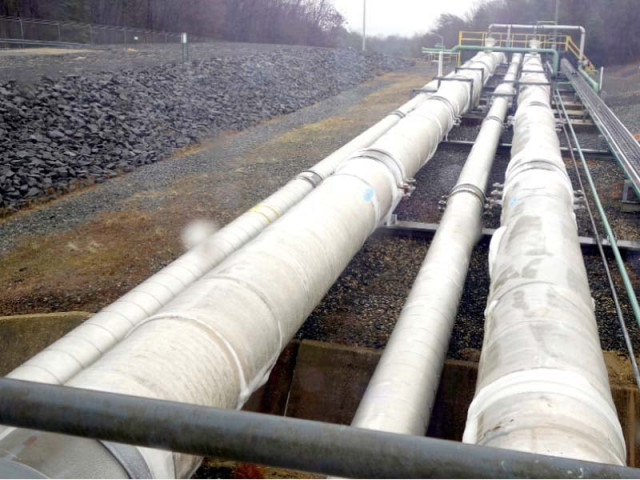Gas pipeline control given to Russia
Project to be executed through special company that will supply gas to Punjab

In a major effort to foster strategic partnership, Pakistan has agreed to give management control of Pakistan Stream Gas Pipeline (PSGP) project to Russia through a special purpose company.
The Russian president had also expressed keen interest in the project that would supply imported gas to Punjab as both sides considered the scheme an opportunity to boost economic and strategic relationship.
The project will mark the emergence of Russian footprint in Pakistan after decades, since the former’s key role in setting up Oil and Gas Development Company (OGDC) and Pakistan Steel Mills (PSM).
Later, during the cold war, Pakistan’s foreign policy favoured the United States rather than maintaining a balance between Washington and Moscow. Even though the two countries did not make much headway in economic relations, Pakistan and Russia entered into military cooperation agreements. The two countries also had an export claims dispute dating back several decades.
However, during the current government’s tenure, the two sides resolved the dispute after 40 years. Now, Russia has a big market for Pakistani products but Pakistan needs to improve quality standards.
Following the resolution of the trade dispute, the two countries found a way to press ahead with the gas pipeline project. It was decided that funds collected on account of gas infrastructure development cess (GIDC) would be spent on laying the North-South Gas Pipeline, now PSGP.
The two countries developed a new structure under which Pakistan would hold majority shareholding. In the revised project structure, Pakistan will hold 74% shares whereas Russia will have 26% stake. Pakistan will also invest the major portion of financing.
Though Pakistan will have majority shareholding in the special purpose company, Russia will take management control of the project.
It was agreed during the first Russia-Pakistan technical committee meeting held from November 16-18, 2020 in Islamabad for the development of North-South Gas Pipeline project. The name of the project was also changed.
According to Pakistan’s law, the majority shareholder takes management control of a company in the public sector. However, it was highlighted that Pakistan was already following a different model in the case of Pak Arab Refinery Limited (Parco) in which Abu Dhabi held minority shares but it had management control.
The designed capacity of the pipeline project has been increased to 1.6 billion cubic feet per day (bcfd) with a 56-inch diametre pipeline.
Pakistan had conducted an analysis of different diametres pipeline and the government came to the conclusion that a 56-inch diametre pipeline would be the most economically feasible that would enable transport of 1.6 bcfd of gas. Later, the capacity will be extended to 2 bcfd.
Officials said Russia-nominated company ETK had experience of building 4,000km pipelines with big diametres.
However, Pakistani companies like Sui Northern Gas Pipelines Limited (SNGPL) did not have the required experience. The Petroleum Division had also asked SNGPL whether it had the experience and capability of building a 56-inch diametre pipeline.
The company management stressed that the project was a historical opportunity for both national gas companies to upgrade their expertise and technical skills. The company said it had requisite inventors and capability to construct a 42-inch diametre pipeline. However, the company would require a new range of equipment along with training of its staff. Considering this, the Russian firm would construct the pipeline and provide the equipment while Pakistan’s gas companies would have the opportunity to work with the Russian firm to upgrade their experience. It would also lead to transfer of technology to Pakistan.
Officials said it was a win-win situation for the two countries. Pakistani companies could seek training from the Russian firm and also new technology.
At present, Pakistan is facing a gas crisis despite imports. The Cabinet Committee on Energy recently considered an option to curtail gas supplies to CNG stations, general industry and captive power plants in the winter season.
Two private LNG companies were setting up two additional LNG terminals in Karachi. These companies require a pipeline to transport imported gas to Punjab.
Pakistan’s dependence on LNG is increasing as it is helping to meet the growing demand for gas. Local gas production is falling by 6.5% annually. Sui Southern Gas Company (SSGC) is going to use LNG for the first time to bridge the shortfall in winter season.
LNG is considered an interim arrangement as different countries import 5-6% gas. However, in Pakistan the scenario has changed as the country is meeting 25% of its demand through LNG.
A new gas pipeline from Karachi to Lahore would not only help attract investment in setting up LNG terminals but it would also help meet rising demand for gas.
Published in The Express Tribune, November 29th, 2020.
Like Business on Facebook, follow @TribuneBiz on Twitter to stay informed and join in the conversation.



















COMMENTS
Comments are moderated and generally will be posted if they are on-topic and not abusive.
For more information, please see our Comments FAQ